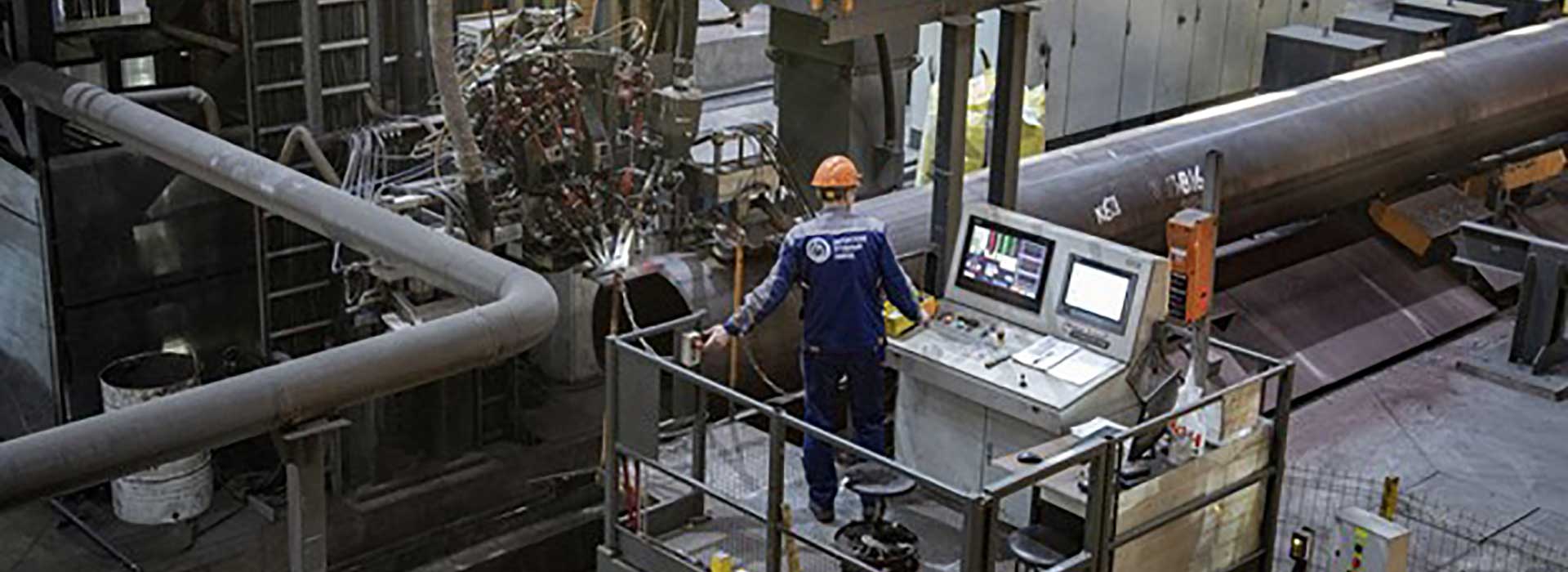The European Union has been struggling to achieve unity with regard to imposing sanctions that prohibit the buying of Russian fuel, particularly oil, as member countries worry that such sanctions would endanger their individual economies. Meanwhile, the U.S. government has committed more than $3 billion to support battery production in the United States for electric vehicles, viewing it as a national defense issue.
Conflict in EU Over Proposed Sanctions Against Russian Fuel
The EU is facing some division over its proposed imposition of a ban on purchasing oil from Russia, as part of a new package of sanctions against that country for its aggression against Ukraine.
EU countries have paid Russia almost $15 billion for oil and more than $30 billion for gas over the past few months since its invasion of Ukraine, and the president of Ukraine has been urging his European neighbors to cut the supply of revenues to its attacker.
An embargo against Russian oil was proposed, despite it representing a smaller share of the revenue flowing to Russia from its fuel exports, because ending the gas supply would be much more problematic for European countries.
The agreement on an oil embargo was finally reached after Germany, one of the biggest markets for Russian oil and gas, agreed to support such a move. It warned, however, that cutting off Russian gas supplies would have a very detrimental effect on its economy.
However, some European countries have expressed their opposition to an oil embargo, particularly Slovakia and Hungary. Slovakia relies on Russia for almost all of its oil supplies, while Hungary relies on it for nearly 60% of its oil supplies.
To soften the impact of an embargo on those two countries, the EU is offering to grant them an exemption or a longer period to move away from Russian imports.
The Organization of Petroleum Exporting Countries (OPEC) has at the same time made it clear that it will not be increasing oil production to offset a fall-off in Russian supplies.
The U.S. has responded to the crisis by releasing supplies from the country’s strategic petroleum reserve, whereas dozens of other countries have agreed to increase their supplies of oil to the market.
Analysts suggest two possible scenarios could unfold in response to a halt in purchasing Russian oil. They suggest that on the one hand, the resulting pressure on oil prices could push the price of a barrel up to $180; on the other hand, they suggest that Russia may sell its oil at a steep discount to countries in urgent need and the price could then drop to around $60 a barrel.
The EU imports about a quarter of its oil supply from Russia and 40% of its gas.
Several countries face an additional dilemma due to Russia’s demand that they pay in rubles. The EU has told its members that if they do pay in rubles they would be violating the EU’s current sanctions against Russia. However, countries have been looking for a way to work around the sanctions and continue importing the much-needed fuel supplies.
Poland and Bulgaria have outright refused to make payments in rubles, which led to Russia cutting their gas supplies.
One of Germany’s largest energy firms announced it will continue to purchase Russian gas by paying euros into Russia’s Swiss-based Gazprombank, from which the payment would be converted into rubles in compliance with Russia’s demands. The firm’s officials said such a move remained in compliance with existing EU sanctions.
US Government Gives Billions for EV Batteries
The Biden administration has deemed battery production for electric vehicles a national defense issue for the U.S., and is supplying just over $3 billion to firms in the U.S. willing to build plants to manufacture them.
The funds will be disbursed as matching grants to help companies that will process raw materials into finished products. It’s also hoped that firms will establish recycling facilities to permit the use of materials from spent batteries.
Officials said the idea is to improve the overall supply chain for EV batteries, while reducing the environmental impact of such manufacturing.
Companies that invest in battery production will be given a minimum of $50 million in government grant funding, which they’re required to match with an equivalent investment of their own money when establishing their production facilities.
The grant funds will come from the more than $7 billion allocated to the U.S. battery supply chain in the Bipartisan Infrastructure Law. That law has allocated additional billions for EV charging stations and the electrification of public transport vehicles.
General Motors has said it wants to have greater control over its EV battery supply and is looking at building numerous battery manufacturing plants.
President Biden has used the provision of the Defense Production Act with regard to the manufacture of EV batteries, which empowers the government to force increased production of materials for the batteries.
However, the grant funding announced is not intended to support mining of the materials for battery production, but simply the processing of those materials into batteries. China is currently the world leader in both the mining and processing of materials for EV battery production — that is, lithium-ion ones.
Besides lithium, lithium-ion batteries used in EVs rely on nickel, cobalt, and graphite for their production. Russia and Ukraine are major sources of precious metal supplies used for the battery’s manufacture. Industry officials said that securing the supply chain for materials used in battery production is an important issue in geopolitical terms.
The Biden administration wants to see EVs make up 50% of all new vehicles sold in the US by 2030.
Study: Renewables Cannot Keep Pace With Growing Energy Use
Governments should consider ways to reduce global energy consumption since increasing demand is outpacing the supply of renewable energy power, a recent study by an Australian university suggests.
The University of New South Wales Sydney noted in its study that the current socioeconomic system is leading to ever-increasing energy consumption, with which the rate of increasing capacity of renewable energy, despite being considerable, cannot keep up.
Though a transition to 100% renewable energy use is possible, it’s unlikely to happen under the current global economic and social system, the researchers said. They suggest that total energy consumption must be cut by 50% within the next 30 years if the world is to avoid warming above 1.5 degrees Celsius.
The reality is that the planet has limited resources, they said, and cannot support increasing levels of consumption. The study suggests that governments can help shift the current socioeconomic model to one where there is less of a need for higher incomes to sustain a decent lifestyle and therefore the demand for energy would be reduced.
Among the initiatives to drive down energy consumption could be the introduction of shorter work weeks, more public transportation, and universal basic services, the researchers suggested.
County in Ireland Votes to Ban More Wind Turbines
Kerry, a county in Ireland with 364 wind turbines, has voiced its opposition to any further wind energy projects in their space.
County representatives voted against permitting new wind power projects on land, even though several new projects have already received planning permission. They were warned, however, that their concerns would likely be ignored.
The county is said to be capable of producing more than 740 MW of energy from the wind.
However, residents of the area complain that the hundreds of turbines have had a very negative impact on their quality of life, since the county is largely dependent on tourism and many of the turbines were built near houses.
County residents say the area has also become prohibitively expensive, and the price of land in one of the county’s towns was now 1 million euros ($1.06 million) per acre.
UK Offers to Help Trinidad and Tobago With Wind Energy
The U.K. is willing to help Trinidad and Tobago with implementing wind energy projects, including providing needed training and help with legislation to enable such implementation, the islands’ Ministry of Planning and Development announced.
The Ministry described the U.K. as being at the forefront of wind energy use and said that Trinidad and Tobago is keen to work on introducing more renewable energy as part of fulfilling its National Determined Contributions obligation.
The North Coast of Trinidad was suggested as an ideal location for conducting assessments for the placement of potential wind farms.
The U.K. and Trinidad are also discussing working together to establish solar-powered charging stations in remote areas of the island for use by EV owners, as well as other projects to help promote the energy transition.
The U.K. government’s priorities with regard to Trinidad and Tobago are said to include climate change, energy, and trade.
Opinion writer: Jewel Fraser
The opinions, beliefs, and viewpoints expressed by the various authors do not necessarily reflect the opinions, beliefs, or viewpoints of Interactive Energy Group, LLC (IEG) or its parent companies or affiliates and may have been created by a third party contracted by IEG. Any content provided by the bloggers or authors are of their opinion and are not intended to malign any individual, organization, company, group, or anyone or anything.
Brought to you by energysavings.com
All images licensed from Adobe Stock.
Featured image:



